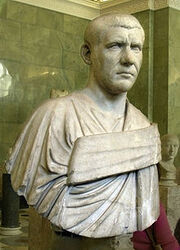
In 244 CE Roman emperor Gordian III responded to an uprising in the eastern provinces instigated by the Persian king Shapur. Under the superb leadership of the Praetorian Guard prefect Gaius Furius Sabina Aquila Timesitheus, the revolt was swiftly suppressed. Unfortunately, after the commander’s sudden death, his successor, Philip the Arab, grew disillusioned with his role as the new commander and set his sights much higher - the imperial throne. According to the Historia Augusta, “This Philip was low born but arrogant and now could not contain himself in his sudden rise to the office and immoderate good fortune, but immediately, through the soldiers, began to plot against Gordian, who had begun to trust him as a father.”
While pretending devotion to the inexperienced emperor, Philip spread false rumors among the troops that the emperor was incompetent and too young to rule. When Philip failed to follow the emperor’s orders to attack Ctesiphon, Gordian grew impatient and “accused Philip of being unmindful of past favors and too little grateful.” He gave the army a choice: him or Philip. They chose Philip. Although the emperor pleaded for his life to be spared, Gordian met his death on February 25, 244 CE near the city of Zaitha on the Euphrates River. His body was cremated and returned to Rome. Without waiting for the Roman Senate to decide, Philip assumed the throne.
Marcus Julius Verus Philippus was born in 204 CE at Philippopolis in Southwestern Syria, the son of an Arab chieftain named Marinus. He would be the first of his race to become emperor. Philip rose quickly through the ranks and when King Shapur instigated his revolt in the east, he traveled with Gordian as deputy prefect of the Praetorian Guard. With the death of Timesitheus (possibly at the hands of the ambitious commander), Philip replaced him, but unlike his predecessor, decided he wanted the imperial throne. However, Gordian stood between him and his dream.
Behind the young emperor’s back, the commander blamed the lack of food and late shipments of grain on Gordian’s inability to rule. When orders were given to attack the Persian capital, Philip resisted, claiming that the emperor was incompetent.
